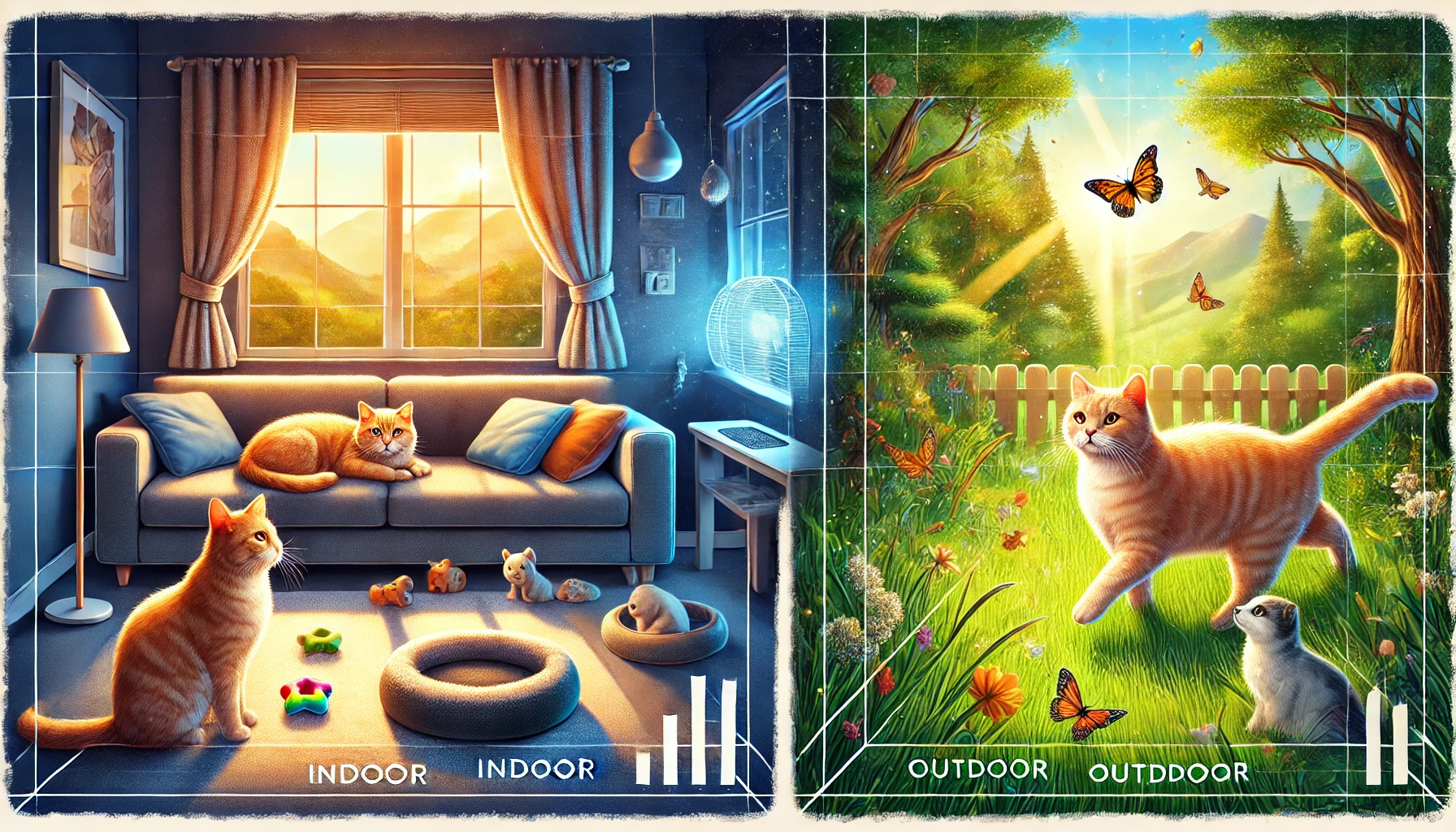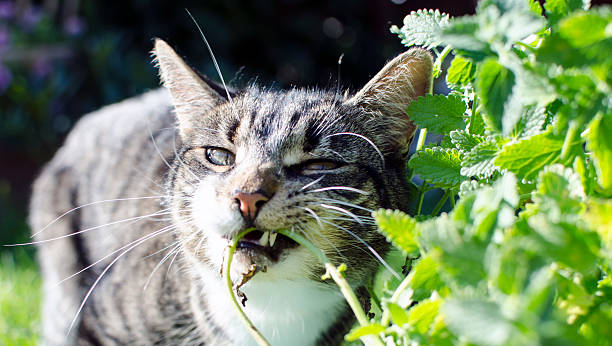
Indoor vs Outdoor Cats: Lifespan Differences
Choosing between keeping your cat interior or letting them roam unfastened out of doors is a big selection. It’s a debate as vintage as time (nicely, nearly as vintage as cats!), and there are robust critiques on each aspects. This article dives deep into the pros and cons of each life-style, assisting you are making the satisfactory preference on your tom cat friend.
Table of Contents
Indoor Cats: Living the Cozy Life
Indoor cats enjoy a lifestyles of consolation and safety within the confines of your home. They’re included from the risks of the outdoor international, like cars, predators, and diseases. Think of it as a tom cat castle of solitude, packed with gentle beds, scratching posts, and endless amusement.
Indoor cats often have longer lifespans because of their reduced exposure to those dangers. They additionally have a tendency to be much less liable to parasites and injuries. Plus, allow’s be honest, who does not love a cuddly kitty curled up on their lap?

Here’s a more in-depth have a look at the benefits and concerns for indoor cats:
Safety First: Protecting Your Indoor Kitty
While the interior is typically more secure, it is not without its ability risks. Think approximately such things as poisonous houseplants, dangling electrical cords, and open home windows. It’s critical to cat-proof your property to limit these risks. This means:
Identifying and casting off toxic vegetation: Lilies, for example, are extraordinarily toxic to cats. Do your research and ensure any plants in your private home are secure in your feline friend.
- Securing cords and wires: Chewing on electric cords can purpose serious injuries or maybe dying. Tape them down, disguise them at the back of furnishings, or use cord covers.
- Securing windows and balconies: Cats are curious and may without problems slip through open home windows or fall from balconies. Install displays or maintain windows closed whilst unsupervised.
- Storing household chemical compounds safely: Cleaning merchandise, insecticides, and other chemical substances need to be saved out of attain of your cat.

Regular vet checkups also are critical, as indoor cats may be vulnerable to obesity and related fitness issues because of a extra sedentary life-style. Providing masses of exercising and intellectual stimulation is key to keeping your indoor cat satisfied and wholesome. This consists of:
- Feeding a balanced weight loss program: Consult your vet to determine the best type and quantity of meals in your cat’s age and interest level.
- Encouraging playtime: Use interactive toys, like feather wands or laser guidelines, to get your cat moving.
- Providing scratching posts: Scratching is a herbal conduct for cats, and it helps them hold their claws wholesome.
Enrichment is Key: Keeping Indoor Cats Entertained
Just due to the fact they are inner would not imply their lives have to be uninteresting! Indoor cats thrive on stimulation. Think interactive toys, climbing trees, and puzzle feeders. Providing quite a few these will keep their minds sharp and their bodies lively.

Window perches are also a extraordinary addition, allowing your cat to have a look at the arena outdoor from a safe vantage factor. Regular playtime with you is likewise important for bonding and exercising. Here are a few ways to enrich your indoor cat’s surroundings:
- Vertical space: Cats love to climb! Provide cat timber or cabinets to allow them to explore their vertical territory.
- Hiding spots: Cardboard packing containers, cat tunnels, or maybe draped blankets can provide comfortable hiding spots to your cat.
- Variety of toys: Rotate your cat’s toys regularly to preserve them interested. Try distinct varieties of toys, which include those who mimic prey, those who dispense treats, and those that encourage interactive play.
- Puzzle feeders: These require your cat to work for his or her food, imparting intellectual stimulation and preventing boredom.
- Catnip and other herbs: Catnip can provide a burst of energy and exhilaration to your cat. Other herbs, like valerian root, will have a chilled impact.
Outdoor Cats: Exploring the World
Outdoor cats experience the thrill of the hunt, the texture of the solar on their fur, and the big expanse of the natural international. They can explore, climb, and have interaction in herbal pussycat behaviors. This can lead to a more physically lively lifestyle and potentially satisfy their natural instincts. For some cats, the liberty of the outdoors is important to their properly-being.

However, permitting your cat outdoors comes with sizable obligations and capability risks:
The Dangers of the Great Outdoors
While the outside gives pleasure, it also offers severa risks. Cars, predators (like coyotes or maybe competitive puppies), and illnesses like FIV and FeLV are real threats. Outdoor cats are also extra at risk of accidents from fights with different animals.
Their lifespan may be appreciably shorter as compared to indoor cats because of these dangers. There’s additionally the potential for them to wander away or emerge as a nuisance to friends. Here’s a breakdown of some of the risks:

Traffic: Cars are a leading cause of dying for out of doors cats. Even in quiet neighborhoods, the risk is tremendous.
Predators: Depending for your vicinity, your cat might also stumble upon predators like coyotes, foxes, or maybe birds of prey.
Diseases: Outdoor cats are much more likely to be uncovered to diseases like feline immunodeficiency virus (FIV) and pussycat leukemia virus (FeLV), which may be transmitted via bites and scratches.
Parasites: Fleas, ticks, and intestinal worms are extra commonplace in outdoor cats.
Poisons: Outdoor cats might also ingest poisonous substances, such as antifreeze or pesticides.
Fighting: Territorial disputes with other cats can cause accidents.
Responsible Outdoor Cat Ownership
If you select to let your cat outdoor, responsible possession is paramount. This includes ensuring they’re vaccinated and microchipped. Consider a collar with an ID tag and a bell to warn natural world. Providing a safe and sheltered space for them to return to is also important.
Supervising their time exterior can also limit dangers. Here are a few pointers for accountable outside cat ownership:

Vaccinations and preventative care: Keep your cat up-to-date on vaccinations and preventative remedies for fleas, ticks, and worms.
- Microchipping: This will boom the chances of your cat being again to you if they wander away.
- Identification: A collar with an ID tag is important, even for microchipped cats.
- Bell: A bell in your cat’s collar can assist warn birds and other flora and fauna of their presence.
- Supervised outings: Consider building a catio (an enclosed out of doors space) or supervising your cat’s outside time to decrease dangers.
- Safe return area: Provide a cat flap or other way in your cat to soundly return to your private home.
- Be conscious of friends: Ensure your cat isn’t always causing a nuisance with the aid of spraying, defecating in gardens, or hunting wildlife.
Frequently Asked Questions (FAQs)
Q: Can indoor cats be satisfied?
A: Absolutely! With proper enrichment and stimulation, indoor cats can stay long, happy, and gratifying lives. They can experience gambling with toys, mountain climbing cat trees, and cuddling with their human companions.
Q: Are outdoor cats happier?
A: Not necessarily. While they will enjoy the freedom, the dangers they face can extensively impact their well-being and lifespan. The risks of harm, ailment, and predation can reason strain and anxiety for both the cat and their proprietor.
Q: What is the average lifespan of an indoor cat?
A: Indoor cats usually live an awful lot longer than out of doors cats, regularly attaining 15-two decades or even more. This is due to their decreased publicity to risks and their access to regular veterinary care.

Q: What is the common lifespan of an outside cat?
A: Outdoor cats, because of the numerous dangers they face, often have shorter lifespans, typically starting from 2-5 years. This highlights the significance of thinking about the capacity dangers earlier than allowing your cat exterior.
Q: Can I educate my cat to stay in my yard?
A: While you could attempt, it is hard to assure that an out of doors cat will stay within detailed limitations. Cats are certainly curious and unbiased, and they may get lost in search of journey.
Q: What are a few signs my indoor cat is bored?
A: Destructive scratching, excessive vocalization, adjustments in appetite or conduct, and over-grooming can be signs and symptoms of boredom. It’s essential to offer enrichment and stimulation to save you boredom and hold your indoor cat glad.
Q: How can I enrich my indoor cat’s environment?
A: Provide interactive toys, hiking systems, scratching posts, window perches, and regular playtime. You can also attempt the use of puzzle feeders, rotating toys, and introducing new scents like catnip.

Q: Are sure breeds better suitable for indoor or out of doors living?
A: Some breeds, like Ragdolls or Persians, are usually better proper for indoor living because of their temperament and bodily characteristics. These cats can be much less geared up to address the demanding situations of the outside.
Q: What should I do if I discover a stray cat?
A: Contact your neighborhood animal safe haven or rescue organization for steering. They allow you to determine if the cat is misplaced or feral and recommend you on the first-class direction of action.
Q: Is it merciless to keep a cat indoors?
A: No, it is no longer merciless. In fact, for lots cats, it is the safer choice. The secret is to offer a stimulating and enriching indoor environment that meets their bodily and mental wishes.
Conclusion: The Purr-fect Choice is Yours
Ultimately, the selection of whether or not to hold your cat interior or permit them outside is a private one. There are legitimate arguments on each facets. Carefully weigh the pros and cons, considering your cat’s individual character, your residing environment, and your capacity to mitigate capability dangers.
The most vital aspect is to offer your pussycat partner with a loving, safe, and stimulating environment, irrespective of whether or not it is interior or out. By information the needs of your cat and making an informed choice, you may make certain they stay a happy and wholesome lifestyles.

Here are some extra factors to don’t forget whilst making your selection:
Your cat’s persona: Is your cat adventurous and curious, or extra timid and cautious?
Your residing surroundings: Do you live in a busy town or a quiet rural location?
Your way of life: Do you have time to oversee your cat outside?
Your private ideals: Do you trust cats must have the freedom to roam, or do you prioritize their safety?
No be counted what making a decision, don’t forget that your cat relies upon on you to provide a secure and loving domestic. By making an informed selection and providing the best feasible care, you can make sure your tom cat pal enjoys an extended, happy, and pleasant lifestyles.


